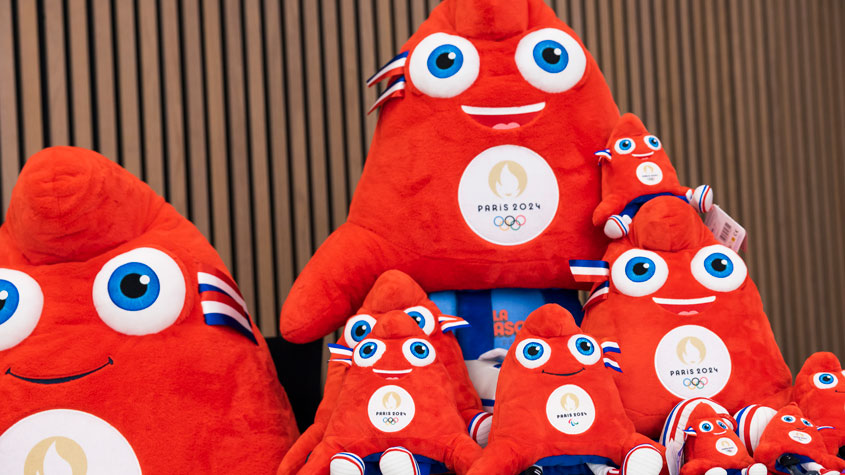Sport and Branding
Sports Trademarks
- are valuable assets
- build trust, confidence and loyalty in a product
- represent, if successful, a promise kept

IP and Sports
By protecting their brand or trademark, organizers of sports events can:
- Ensure that the value and integrity of the event are maintained;
- Maximize commercial revenue from sponsorship, merchandising and licensing agreements to offset the cost of organizing the event;
- Inspire confidence among consumers that the product or image associated with the sporting event is authentic, and that any advertising or promotion that makes reference to the event or to associated images is legitimate.
What can you register as a sport trademark?
A trademark is a badge of origin that enables a customer to recognize a product of a particular company. Depending on domestic law and practice, it can be, for example, a word or name (like Wilson), a symbol (such as Nike’s swoosh or Adidas' three stripes), a number, a color, a shape, or even a sound or smell.
Trademarks distinguish a company, its products and services from those of competitors, acting as a quick and reliable guide to quality. They help the company to build a reputation in the market and to develop and retain a loyal clientele, by instilling consumer confidence and trust in the goods and services it provides. The goodwill associated with a successful trademark or brand can be a huge commercial asset.
(Image: Getty Images/300_librarians)
Brand sponsorship of sport events
The prominent display of trademarks at prestigious sporting events increases sales by appealing to the aspirations and emotions of sports fans, who are drawn to signs associated with a given club or sport. Trademarks can also become symbols of a specific lifestyle or behaviour. Thus sponsorship of a prestigious sports event, such as the FIFA World Cup™ or the Olympic Games, can link a company or product to the prestige, youth and dynamism of that event.

Illegal sports streaming
The importance of branding for athletes and sports clubs
Brand advertising using sports teams and players is also big business, and the financial health of many sports organizations, clubs and even individual athletes can depend on advertising and sponsorship revenue. The more successful a team, the more valuable its brand, and the higher the income and spending power of the sports organization involved. This in turn enhances the entertainment value of, say, a football match, because the club can afford better facilities and more skilful players. Successful examples of the use of trademarks to market and develop the business of sport include the NBA (National Basketball Association) in the United States and Manchester United football club in the United Kingdom.
Registering athletes’ brands as trademarks
Many sports personalities are able to generate significant earnings both from leveraging their own brand as elite athletes and from sponsorship deals with various brand owners. Sporting celebrities can register themselves as trademarks, not only their own name but also nicknames, poses, slogans, signatures, or other insignia for which they well known. Usain Bolt’s “Lightning Bolt” pose and his “to di world” slogan are registered trademarks. Even without a registered trademark, however, celebrity athletes have “image (or personality) rights” to prevent unauthorized use of their name, likeness or other personal attributes.

Protecting sports brands against illegal use in domain names
Intellectual property (IP) rights also enable sports personalities, as well as teams, sports organizations and sports good manufacturers, to protect themselves against abusive and unauthorized use of their name for website addresses. WIPO, among others, operates a quick dispute resolution procedure for website domain names based on internationally-accepted rules.
By protecting their brand or trademark, organizers of sports events can:
- Ensure that the value and integrity of the event are maintained;
- Maximize commercial revenue from sponsorship, merchandising and licensing agreements to offset the cost of organizing the event;
- Inspire confidence among consumers that the product or image associated with the sporting event is authentic, and that any advertising or promotion that makes reference to the event or to associated images is legitimate.
IMAGE: BrianAJackson/Getty Images Plus
IP and Dispute Resolution in Sports
Protecting sports trademarks internationally
Trademarks are protected by entry on a national trademark register. Once registered, they are potentially unlimited in time as long as they are used. WIPO’s international trademark registration system, known as the Madrid System, enables sport trademark holders to file a single application for registration in multiple countries, and to maintain and renew those marks through a single procedure.
Sports trademark stories

IMAGE: BENJAMIN BOCCAS PARIS 2024

IMAGE: Ottobock

IMAGE: Rory Cooper

IMAGE: CNOSF/KMSP

